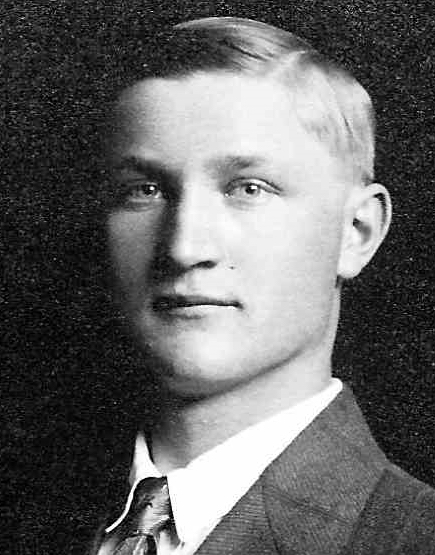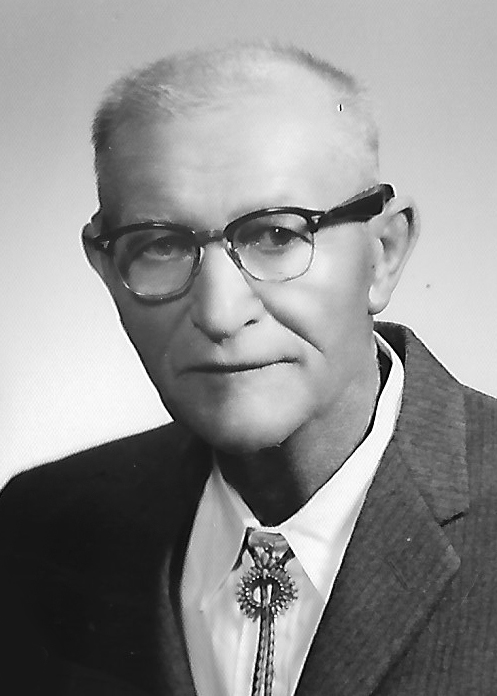
The photo of Dirk (Dick) Gelder — the author’s Opa Gelder — was taken in 1912, several years after he emigrated to Iowa from Germany as a young teenager, settling near Cleves in Hardin County. As a young married man he lived and worked in Hamilton, Kossuth and Winnebago counties and spent the last 30 years of his life near Wellsburg in Grundy County.
Nov/Dec 2023 (Volume 15, Issue 6)
By Arvid Huisman
As a child I referred to my grandparents by their German and Dutch titles: Opa and Oma. Though they have all passed on, I still remember them as Opa and Oma.
My maternal grandfather, Opa Gelder, was a teenager when he came to the United States from East Friesland in northwestern Germany. Although he learned English and could speak it reasonably well, his speech always bore a strong hint of his mother tongue.
Opa has been gone for nearly 60 years now. After all these years the one word I can still clearly hear him say is “thanks.” When Opa said it, however, he said “dank” — the way he learned to say “thanks” as a boy. Opa’s “dank” rhymed with “honk.”
Pour him a cup of tea and Opa would say, “dank.” Pick up his cane and hand it to him and he’d say, “dank.” Hold a door open for him and he’d say, “dank.” I know it’s an insignificant memory but it’s a good one.

Photo of Gelder taken in 1963.
And “thanks” is a good word. A simple “thanks” can bring sweet harmony to the most cacophonous day.
An incident that took place when I was still in the newspaper business reminds me of the power of a “thank you.” Media folks are lightning rods for criticism and it had been a difficult week. The brouhaha was over a news story and photo and the criticism had become personal.
As I’m going through my mail a few days into the fury, I saw an envelope from a local pastor. Surely he wasn’t going to hammer on me, too, I thought.
Upon opening the envelope I read a thoughtfully written thank you note from the pastor on behalf of his congregation for a story we had published about a program at their church.
After reading the note twice, I picked up the phone and called the pastor. He seemed puzzled by my call thanking him for his thank you note. When I explained the week I had endured he understood.
A brief and simple thank you made the criticism a little easier to handle.
Fast forward to about nine years ago. At a busy Ames intersection, Julie and I spotted a man holding a cardboard sign indicating he needed gas money. My immediate response was cynical. Julie, however, has a big heart and a keen perception of people. She encouraged me to stop and determine the need.
When I asked the man why he needed gas money, I discovered we had a problem. His broken English wasn’t much better than my even more broken Spanish. I finally understood that he and his wife had driven to Ames from central Kansas for a job interview and they didn’t have enough gasoline to return home to their children.
He seemed sincere so I told him to pull up his car to a nearby gas pump and I would fill the tank. Expecting a Honda Civic or something similar, my frugal heart sank when he drove an older passenger van up to the gas pump.
The big tank was indeed empty but I had committed to a tank of gas so I filled it to the top. While the gas was pumping it occurred to me that if the man didn’t have gas money he may not have money for food as well. They had a very long drive ahead of them. I inquired and he indicated he had no money for a meal.
Having put the hefty gas bill on my charge card, I reached into my wallet and gave him some cash for supper.
The man began to thank me. While my Spanish is limited I understand “gracias,” especially when it’s repeated multiple times. By now the man was crying and I choked up when he took my hand and kissed it, repeating “gracias” several times more.
Frugal me was slightly embarrassed but completely blessed. The man’s tender show of gratitude was worth more than whatever I had invested to help him. I noted that more dramatic expressions of gratitude, while unnecessary, are meaningful, too.
Thanksgiving Day 2023 surely won’t be the day of gratitude the Pilgrims first observed. Despite climate changes, political hostilities, the war in Ukraine and many other current problems, we have so much more for which to be thankful.
If Opa Gelder had been called on to give thanks on Thanksgiving, I imagine he would have said little more than a simple “dank.”
To the One from Whom all blessings flow, I believe my grandfather’s humble “dank” would be acceptable. The Kansas traveler’s more expressive style of “gracias” would likewise be acceptable.
Gratitude is not so much the words we use but the attitude of the heart.
TO READ MORE FASCINATING STORIES ABOUT IOWA HISTORY, subscribe to Iowa History Journal. You can also purchase back issues at the store.
